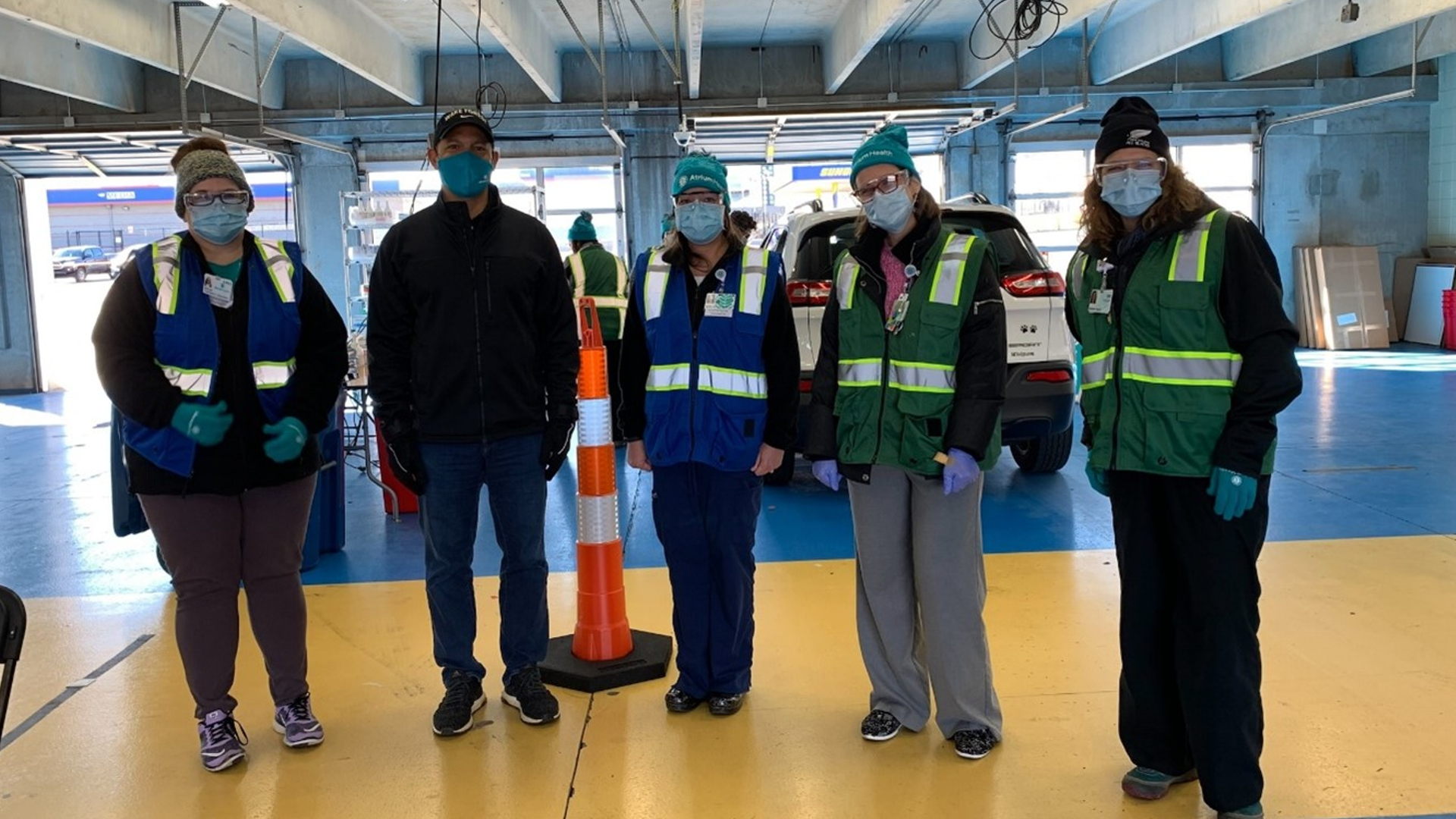“Can you get to the airport center to get to your COVID-19 vaccine in the next 20 to 30 minutes?”
For Dr. Katie Passaretti, Atrium Health vice president and enterprise chief epidemiologist, that phone call on December 14, 2020, changed her life. And, it changed the course of the pandemic.
“It’s definitely a day that I’ll remember forever. And that was probably the best day I’ve had so far in the pandemic.”
That Monday morning started like any other since the World Health Organization declared COVID-19 a pandemic in March 2020. Dr. Passaretti woke early as she always does, got in a workout and loaded up an audiobook for the drive to her office near Atrium Health Carolinas Medical Center where a day filled with meetings and treating patients awaited her.
She was at her desk when she received that life changing phone call. She immediately got back in her car and headed to Atrium Health’s offices near the airport.
“I remember crying on my way to get the vaccine because so many things were running through my head,” said Dr. Passaretti. “This was a day we’d waited for, for so long.”
When she arrived, the truck was still unloading the first boxes. Inside, were small, nondescript vials of the Pfizer-BioNtech COVID-19 vaccine.
A tiny shot of hope.
As she held the vial in her hand, Dr. Passaretti couldn’t help but smile as visions of her patients, her family, friends and community passed through her mind. That vial, she knew, would change everything.

After lending her expertise in interviews in newspapers and on television stations throughout the southeast and across the country, Dr. Passaretti had become one of the faces of the pandemic. It seemed only fitting that on that December morning, she became the first person in the state of North Carolina, and one of the first in the nation, to be vaccinated for COVID-19.
“I was so honored to be the first in North Carolina to receive the vaccine,” Dr. Passaretti said. “But also I felt full of hope and excitement for our patients, our health care workers and our communities to know they would have access to another layer of protection against this deadly disease.”
Since that day, the vaccine has saved hundreds of millions of lives around the world.
“It’s truly an amazing miracle of science and health care. And I am so proud of the work of my Atrium Health teammates and by our teammates in health care around the world who are making sure people have access to vaccines.”
For Dr. Passaretti, some of the most incredible moments of the last year came at Atrium Health’s mass vaccination events. She volunteered at as many as she could, for the opportunity to help vaccinate as many people as possible, including, her own husband.
“That made me incredibly happy – and not just because I got to stick him in the arm,” she laughs, “But because I knew then that he would be protected.”


But now, a full year after vaccines first became available, there are still millions of Americans who remain unvaccinated. Dr. Passaretti recently lost a close friend who was unvaccinated to COVID-19.
“It’s been a long couple of years and there have been moments of hope and amazement at how far we’ve come,” she said. “But it’s hard to watch people continue to repeat past behaviors and still decide not the get the vaccine, when you know the level of protection it can provide.”
And while she marvels at how far science has come since the discovery of SARS-CoV-2, from the development of the vaccine and treatments to learning more about how the virus behaves, she acknowledges that there is still much to learn.
“The COVID virus is a respiratory virus that continues to change over time. As we have this sort of partially vaccinated society, it gives the virus a chance to continue to spread and mutate,” she explained. “That’s why vaccines are still incredibly important, and why those who are vaccinated, need a booster. I would not be surprised if we need additional boosters or if COVID-19 vaccines become something we need more regularly, like the annual flu shot.”
The arrival of the Omicron variant provides more proof that this pandemic is not over yet.
“It’ll be interesting to see how history reflects on this time as a time of scientific advancement,” she said.
Atrium Health and Atrium Health Wake Forest Baptist take part in a grant that allows for genetic sequencing on samples from COVID-positive patients to show exactly what variant is detected.
“We’re now conducting several hundred of these tests per week which allows us to pick up things like Omicron early and be able to act early and guide our community actions. That is impactful,” Dr. Passaretti said.
Atrium Health has taken part in a number of clinical trials for medications to help treat and prevent COVID-19 infection as well as some of the trials for COVID-19 vaccines.
“That’s something I’m incredibly proud of. Not only have we been a leader in research and development, we’re continuing to do our part to ensure access to vaccines for our entire community, through mass vaccination events and mobile vaccinations,” she said. “We’re holding ourselves accountable and I could not be prouder to be a part of this team.”
While her work continues, there are several things Dr. Passaretti is looking forward to in the coming year. A traditional holiday season celebrating safely with vaccinated family and friends, catching up on some of her favorite baking shows, and perhaps even a bit of holiday music, playing guitar alongside her husband.
And like all of us, she has high hopes for 2022.
“We’re never going to completely get rid of COVID-19 – that’s become abundantly clear. But I hope that a year from now it’s endemic, like the flu. I’m hopeful we’ll get to a point where this is manageable and I think we’re getting closer and closer to that every day.”



